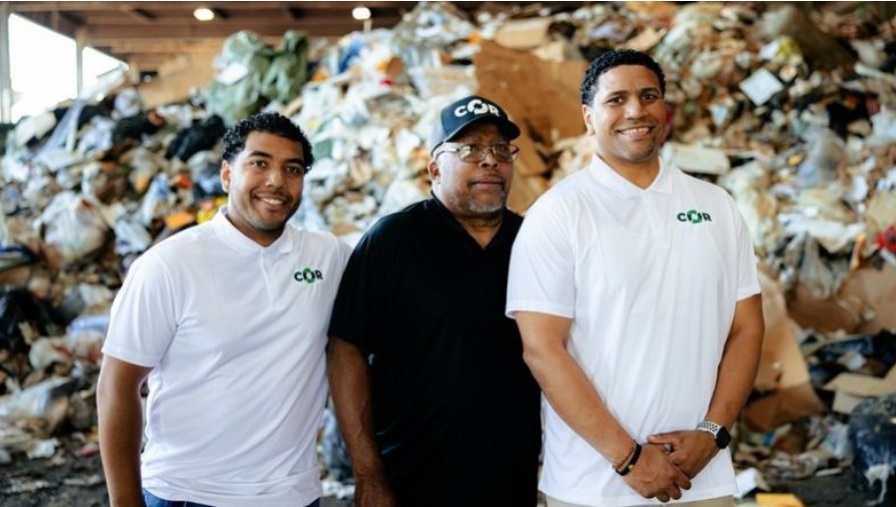
By Oregon Business and Industry,
Portland solid waste management and recycling company COR made a splash in early November by unveiling the state’s first electric garbage truck, a Peterbilt rear-loader that holds a big enough charge to conduct a full day of bin pickups without stopping. The new truck is one of about 25 collection vehicles operated by the company, whose success since its founding in 1997 has less to do with splashiness than hard work and business savvy fueled by a clear mission.
Founder Al Simpson (above center) joined the city of Portland’s maintenance bureau in 1992. For several years, he operated a roll-off truck that carried debris to Metro’s transfer station. Early on, he recognized the growth potential of recycling in the region, says son Alando Simpson (above right), now the company’s CEO. He also took note of the lack of diversity in the hauling business.
Determined to contribute to the development of the city’s recycling efforts and to create leadership opportunities for non-white employees, Simpson took a risk. In 1995, with cash raised by a second mortgage on the family home, Simpson bought a roll-off truck and a dumpster and began hauling waste on his own. The business, known initially as City of Roses Disposal and Recycling, now employs about 85 people, the vast majority of whom, including managers, are not white. Along the way, according to the company, COR became the only black-owned B-Corp waste company in the nation.
Success did not come quickly or easily, however. Because it isn’t a residential collection franchisee, the company couldn’t rely upon a guaranteed revenue stream to operate and grow. Instead, it manages commercial and municipal waste on a contract basis. Competition is fierce, and growth took time.
But grow the company did. About a decade after buying his first truck, Simpson acquired a two-acre site in Portland to establish a recycling facility. Years of planning and permitting work followed, and in 2014 the facility was authorized.
Only a few years later, driven by accelerating growth, the company bought a 12-acre property e and opened its own transfer station. Owing to its location in east Multnomah County, the transfer station is the most convenient such facility not only for the company’s own vehicles, but also for those of its competitors. This allows COR to charge other companies for dropping off material while ensuring the transfer station has the volume needed to operate efficiently.
And as Al Simpson anticipated back in the 1990s, COR has become an important player in regional recycling. Adjacent to the company’s transfer station is a material recovery facility operation that has diverted more than 100 million pounds of debris from regional landfills, the company estimates. Some of this material is separated from the waste stream that enters the transfer station. Some, too, is generated by COR’s demolition service, which pulls apart structures and maximizes the reuse of their materials.
In everything it does, meanwhile, COR seeks to become more sustainable. The company began to use biodiesel in its vehicles more than a decade ago, and last January it transitioned all of its trucks to biodiesel, according to The Oregonian. The electric truck, financed through Portland General Electric’s Drive Change Fund, is the next step.
Alando Simpson expects the company his father created to keep growing, beginning with its collection operations in Portland. He also intends to look for opportunities in the region encircling Portland, including Clark County in Washington.
Disclaimer: Articles featured on Oregon Report are the creation, responsibility and opinion of the authoring individual or organization which is featured at the top of every article.

